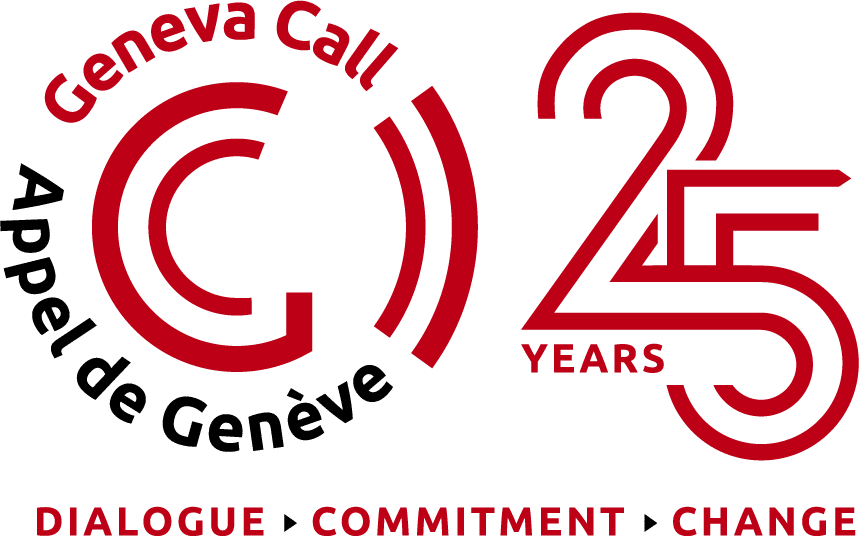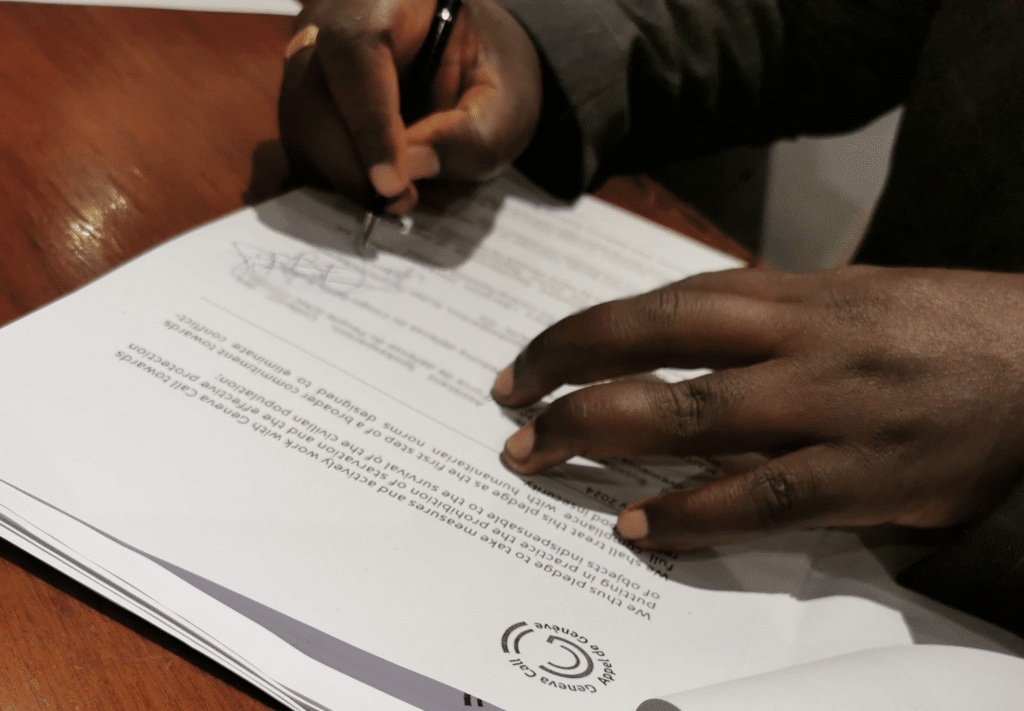
Seven armed groups reinforce their commitment to prevent food insecurity and sexual and gender-based violence in East Africa
5 February 2024
During a regional conference organized by Geneva Call, representatives from seven armed groups pledged to strengthen their efforts to prevent food insecurity and sexual and gender-based violence in armed conflicts.
The event gathered groups from the Democratic Republic of the Congo (DRC), the Republic of the Sudan, and the Republic of South Sudan – three countries where civilians have had to bear the brunt of decades of armed conflict. In this region, millions of people are confronted with high levels of conflict-related food insecurity and widespread sexual and gender-based violence. Against this backdrop, Geneva Call has been building and maintaining a humanitarian dialogue with these groups for several years.
Collective dialogue
The conference was held in the format known as the “Garance Talks”. Named after the headquarters of Geneva Call in Switzerland, the concept behind such an event is to create a forum in which representatives of various armed groups and de facto authorities (AGDAs) can discuss specific humanitarian topics. “While the humanitarian dialogue we have with AGDAs on the ground is constructive, we have learned that additional multi-party discussions can be beneficial,” points out Omar Ahmed, Head of Region for Africa at Geneva Call. “They do not necessarily know each other but may face common challenges in their understanding and implementation of humanitarian norms. Consequently, there are concrete good practices that can be exchanged, and the groups can learn from one another,” he adds.
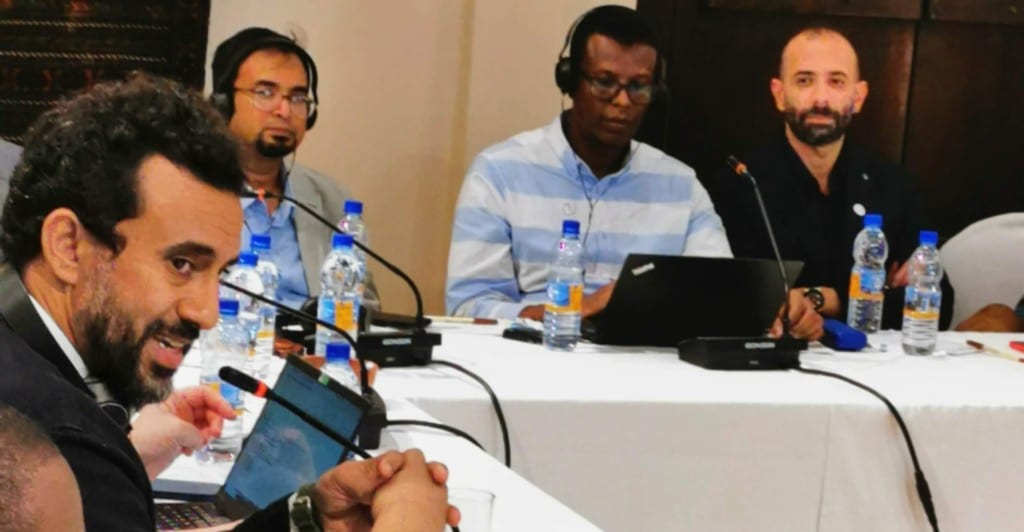
A region deeply marked by conflicts
East Africa and the Great Lakes region have seen a significant surge in armed violence over the past few months, further deepened by the fragmentation among the different armed groups present in the area. A violent conflict erupted in Sudan in April 2023, leaving millions of civilians deprived of basic services and exposed to urban warfare. South Sudan, the youngest state in the region, frequently experiences political tensions that add to ethnic and communal violence scattered throughout the country. Finally, in Eastern DRC, instability has also increased with hostilities involving many armed groups engaged in identity and resource struggles. In this context, millions of civilians are left without even a minimum of protection, and numerous violations of International Humanitarian Law (IHL) have been observed.
International Humanitarian Law as a framework for dialogue
Geneva Call is dedicated to protecting civilians in contexts of armed conflict by generating long-term change in AGDAs’ behavior. Aimed at fostering the ownership of members of AGDAs of the principles of IHL, over the last 20 years, the organization has engaged in a dialogue with more than 100 AGDAs, and currently with more than 20 in the East Africa region, raising their awareness of and compliance with IHL.
Facilitated by Geneva Call’s thematic and legal experts, this edition of the Garance Talks focused not only on the legal concepts relevant for AGDAs under international law, but also on concrete approaches to their implementation on the ground.
“IHL provides an effective framework that is actually quite practical. It can guide the actions of groups in relation to a specific topic,” says Sandra Krähenmann, in charge of policy, research, and legal affairs at Geneva Call. “That’s why the exchanges held under the format of the Garance Talks focus on strengthening the understanding of what IHL stipulates by analyzing concrete case studies”.
Significant stakes for the protection of civilians
Food insecurity is one of the most serious protection challenges in East Africa. According to the latest Integrated Food Security Phase Classification (IPC) data, more than 45 million people in Sudan, South Sudan, and DRC face high levels of acute food insecurity. “Armed conflict is a significant driver of food insecurity in these countries that, in turn, exacerbates armed conflict, leading to a vicious cycle. Persistence of armed conflict also weakens resilience to other factors, such as climate and economic shocks” Areva Paronjana, Geneva Call’s expert on famine and food insecurity in emergencies, points out.
Numerous reports and studies highlight the strong impact that the conflict parties have on food security. This includes actions such as looting and spoiling of crops, disruption of local markets, displacement of populations, and destruction of infrastructure, including irrigation systems. Therefore, raising awareness among AGDAs is a crucial approach to prevent food insecurity and famine among the civilian population.
“For us, it is important not only to continue to engage with AGDAs on their obligations in the areas of their influence, but also to find very concrete ways for them to refrain from behaviors that could have a negative impact on food security,” adds Areva Paronjana.
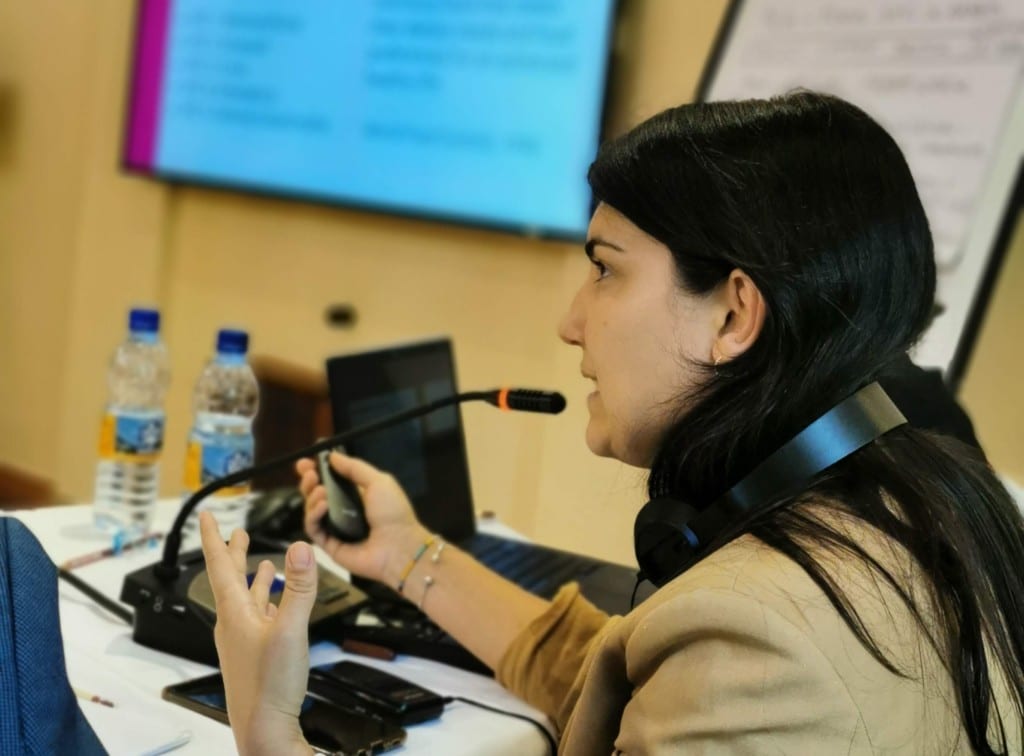
From relief to long-term resilience
Asked about the actions their groups can take in this regard, the representatives emphasized the need for the long-term resilience of the civilian populations living in areas under their control. “While facilitating humanitarian assistance is important, it is even more important to achieve the autonomy of our communities. Part of our action aims to encourage them to cultivate more land,” stresses an armed group representative from Sudan. “We provide fishing kits and agricultural machines to ensure that populations can work their fields,” says a representative of a group controlling a large territory in South Sudan.
The discussion also highlighted the negative impact that checkpoints and other forms of interference have on food security. Taxes, confiscations, or levies are all obstacles to the ability of the civilian population to buy or sell their crops. “Our primary mission is the protection of property and people. For example, we aspire to prevent administrative harassment and taxes on civilians because they impact the price of food and livestock,” affirmed a representative of an armed group present in Eastern DRC. While these actions illustrate a certain level of understanding of the importance and responsibility of ensuring food security for civilians, the reality on the ground indicates that serious impediments to food security are still observed as directly or indirectly perpetrated by the different parties to the conflicts mentioned.
From denial to the prevention of sexual and gender-based violence
The second day of the conference was devoted to the issue of sexual and gender-based violence. This topic remains highly prevalent in the region’s conflicts, with most of the reported acts being attributed to AGDAs.
“Discussing this issue with combatants is not easy. It is often marked by denial, taboos, or stigmatization,” notes Camille Jaquot, Geneva Call’s IHL Advisor based in Juba. “Our dialogue on this issue often only comes after strong trust has been established. Furthermore, the fact that we meet discreetly in a third country allows discussions to be franker,” she adds.
Although the discussions mostly focused on sexual violence, Geneva Call’s experts reminded participants that gender-based violence includes other types of violence that can arise, for instance, from the private sphere (such as domestic violence) or traditional harmful practices. Moreover, throughout the discussions, emphasis was also put on the forms of sexual and gender-based violence affecting men.
From impunity to awareness and persecution
Several participants presented their range of measures against sexual and gender-based violence, as well as the challenges they face with implementation in times of complex hostilities. Emphasis was also put on the consequences that combatants face when they commit sexual and gender-based violence. These can range from enshrining such acts to being a breach of the group’s code of conduct to handing guilty combatants over to official state authorities. The latter, however, does not come without significant legal and security challenges: “In the area under our control, we have handed over 17 of our fighters to the state authorities for sanctions. By doing so, they are at risk of also being penalized for having participated in an insurrectional movement. So, it’s very complicated for us,” adds a legal advisor from an armed group.
Another challenge raised pertained to the compliance of sanctions with International Humanitarian Law (IHL) and International Human Rights Law, as instances of summary execution of combatants were repeatedly mentioned. “The prevention of gender-based violence is important to us. Since we are committed to the law at all times, it is essential to institute, for example, a system of sanctions, but also to ensure that these sanctions themselves respect human rights,” states a group’s representative.
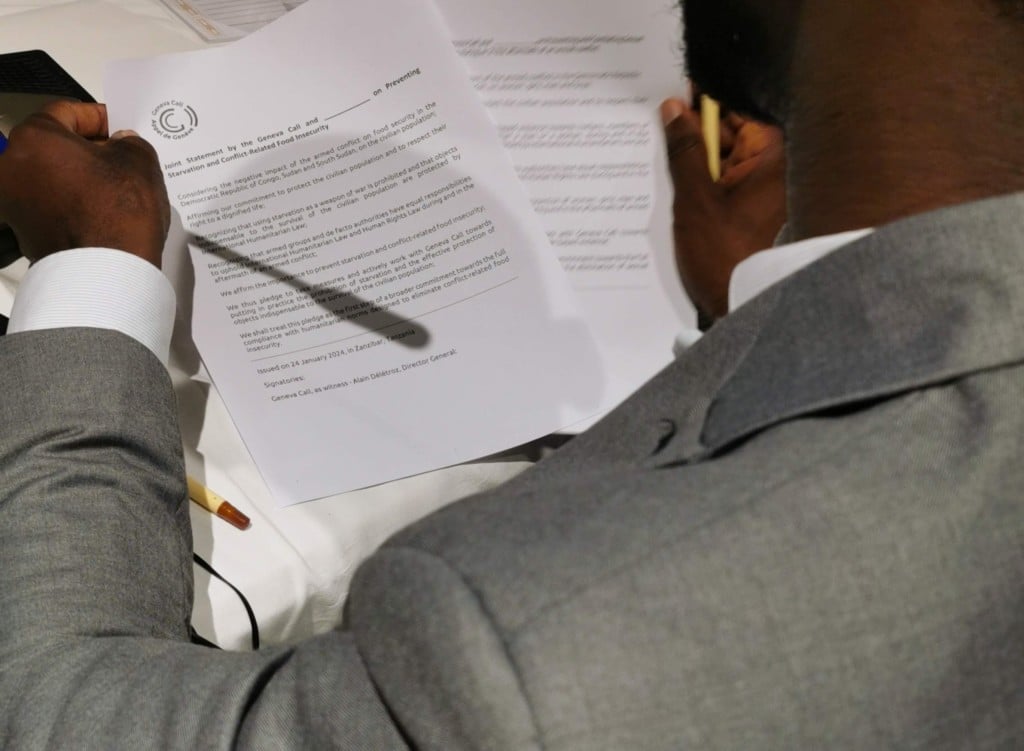
Two joint statements
The conference concluded with joint statements made by AGDAs’ representatives, acknowledging the importance of preventing food insecurity and sexual and gender-based violence. The groups committed to deepening their efforts in the future, which includes the continued dialogue with Geneva Call. While unilateral declarations are common tools used by Geneva Call in its engagement with AGDAs, the organization’s well-known and most formal engagement tool, which is used at various stages of the dialogue, remains the Deed of Commitment.
“There is still much to do, but the exchanges of the last two days have demonstrated a positive spirit among the groups and their willingness to do more. I am pleased with this, and on our part, we are eager to continue engaging these groups to enhance their knowledge and compliance with humanitarian norms and to advocate for behavioral change,” states Alain Délétroz, Director General of Geneva Call, who opened and concluded the conference.
